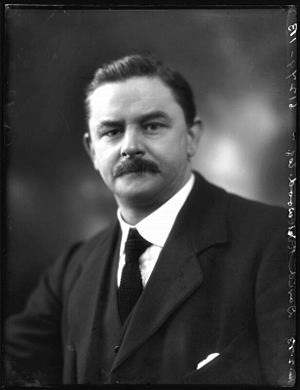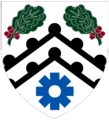David Kirkwood facts for kids
Quick facts for kids
The Lord Kirkwood
PC
|
|
|---|---|
 |
|
| Member of Parliament for East Dunbartonshire Dumbarton Burghs (1922–1950) |
|
| In office 15 November 1922 – 5 October 1951 |
|
| Preceded by | John Taylor |
| Succeeded by | Cyril Bence |
| Personal details | |
| Born | 8 July 1872 |
| Died | 16 April 1955 (aged 82) |
David Kirkwood, 1st Baron Kirkwood (born July 8, 1872 – died April 16, 1955), was an important Scottish politician. He was also a leader for workers in trade unions and a socialist activist from Glasgow. He played a big role during a time known as the Red Clydeside era, when many workers in Glasgow stood up for their rights.
Contents
David Kirkwood's Early Life and Work
David Kirkwood went to Parkhead Public School. He then trained to become an engineer. His first steps into politics were through his trade union, called the Amalgamated Society of Engineers. He also joined the Socialist Labour Party. In 1914, he left that party to join the Independent Labour Party (ILP). For many years, he was known as the main leader for engineers in Scotland.
Fighting for Workers' Rights
Kirkwood was part of the Glasgow Trade Council. He was also a member of the Clyde Workers' Committee (CWC). This group was led by William Gallacher. The CWC started because of a pay disagreement among engineers on the Clyde in 1915.
The committee worked to oppose government rules during World War I. These rules affected workers' ability to change jobs and how skilled tasks were done. Kirkwood was a leader for workers at William Beardmore and Company. In January 1916, he helped reach an agreement about how new workers would be trained.
In March 1916, Kirkwood was arrested and sent away from Glasgow to Edinburgh. This happened because of a strike related to the new agreement. This event made him even more well-known. He came back to Glasgow in 1917. He then worked as a foreman at the Mile-End Shell Factory.
In January 1919, Kirkwood was a key figure in the "40 Hours' Strike." He was involved in a protest in George Square, Glasgow, and was arrested. However, he was later found not guilty of causing a riot.
Becoming a Member of Parliament
In 1922, David Kirkwood was elected to the House of Commons. He became a Member of Parliament (MP) for Dumbarton Burghs. Before this, he had served for four years on the Glasgow Town Council.
In 1924, Kirkwood and another MP, James Maxton, caused a stir in Parliament. They protested when other politicians tried to stop a bill about Scottish Home Rule.
Kirkwood was a leading member of the ILP in Parliament. This party often disagreed with the main Labour Party. In the 1931 election, he was one of five ILP MPs elected without the Labour Party's support.
However, in 1932, the ILP decided to separate from the Labour Party. Kirkwood disagreed with this decision. He left the ILP and joined a new group called the Scottish Socialist Party. He then rejoined the Labour Party. In 1935, Kirkwood wrote a book about his life called My Life of Revolt.
Saving the Queen Mary Ship
In January 1931, a huge ocean liner called the Queen Mary began being built in Kirkwood's area, Clydebank. It was being built by John Brown & Company for the Cunard Line. But work stopped because there wasn't enough money. Many workers lost their jobs in December.
Kirkwood worked hard throughout 1932 to save the ship. He even got help from the Prince of Wales. His efforts paid off! The UK Government passed a law in 1934 that gave a loan of £9.5 million to the company. This allowed the Queen Mary to be finished in 1934. Part of the loan was also for the Queen Mary's sister ship, the Queen Elizabeth.
When the Queen Elizabeth started being built in 1936, the head of Cunard, Percy Bates, wrote to Kirkwood. He said that Kirkwood's belief in the workers of the Clyde had given them the courage to borrow the money.
Later Political Life
David Kirkwood supported Home Rule for Scotland. This meant he believed Scotland should have more control over its own affairs. In 1935, someone described Kirkwood as a polite man who loved many things. These included porridge, politics, the Bible, Scottish Home Rule, and his family.
In 1948, Kirkwood became a Privy Counsellor. This is a special group of advisors to the King or Queen. When his old area was changed in 1950, he was elected for the new area of East Dunbartonshire. He left the House of Commons in 1951.
On December 22, 1951, David Kirkwood was given the title of Baron Kirkwood, of Bearsden. He passed away on April 16, 1955, at the age of 82.
Images for kids
 | Victor J. Glover |
 | Yvonne Cagle |
 | Jeanette Epps |
 | Bernard A. Harris Jr. |



